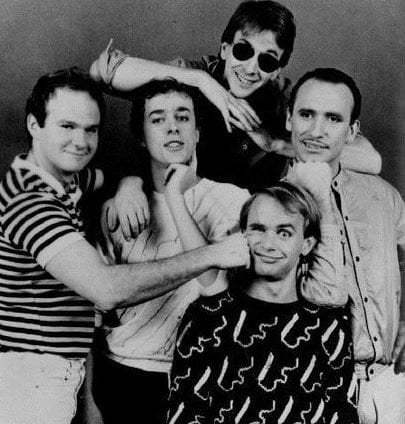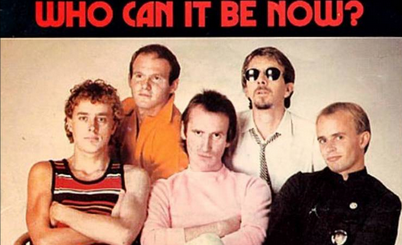Who Can It Be Now? by Men at Work Lyrics Meaning – Unlocking the 80s Classic’s Profound Commentary on Privacy and Paranoia
- Music Video
- Lyrics
-
Song Meaning
- The Siren Call of the Saxophone: A Melodic Gateway to the Soul
- A Knock at the Door of the Psyche: The Anthem’s Echoing Sentiment
- Veiled Lyrics: Unraveling the Song’s Hidden Meaning
- Decoding Symbolism: ‘Is it the man come to take me away?’
- Unforgettable Lines and Everlasting Hooks: A Catalyst for Nostalgia
Lyrics
Go ‘way, don’t come ’round here no more
Can’t you see that it’s late at night?
I’m very tired, and I’m not feeling right
All I wish is to be alone
Stay away, don’t you invade my home
Best off if you hang outside
Don’t come in, I’ll only run and hide
Who can it be now?
Who can it be now?
Who can it be now?
Who can it be now?
Who can it be knocking at my door?
Make no sound, tip-toe across the floor
If he hears, he’ll knock all day
I’ll be trapped, and here I’ll have to stay
I’ve done no harm, I keep to myself
There’s nothing wrong with my state of mental health
I like it here with my childhood friend
Here they come, those feelings again
Who can it be now?
Who can it be now?
Who can it be now?
Who can it be now?
Is it the man come to take me away?
Why do they follow me?
It’s not the future that I can see
It’s just my fantasy
Yeah
Who? Who? Who?
Who can it be now?
Who can it be now?
Who can it be now?
Who can it be now?
Oh, oh, oh
Who can it be now?
Oh we oh
Who can it, who can it
Oh, who can it be now?
Oh, we, oh
Yeah, yeah, yeah
In the turbulent tide of the early 1980s, a song emerged that captured the zeitgeist of a society grappling with the paranoias of an ever-watchful world. Men at Work’s ‘Who Can It Be Now?’ melds a catchy saxophone hook with an undercurrent of anxious introspection, becoming a classic track that continues to resonate with audiences today.
While on the surface the song is a radio-friendly hit, digging deeper reveals layers of meaning about the human condition, privacy, and psychological boundaries. This sonic exploration offers a retrospective on the nuances hidden within the seemingly simplistic questioning: Who can it be now?
The Siren Call of the Saxophone: A Melodic Gateway to the Soul
The song’s iconic saxophone riff isn’t just an earworm; it operates as an emotive siren calling out to the listener, signalling a narrative of unease and suspicion. The persistent knock of the sax mirrors the knocking at the narrator’s door, creating a harmonious loop that pairs music with storytelling in a way that is both profoundly unsettling and completely engrossing.
But the instrument does more than mimic the knocks. It plays the role of the inner voice, the wild and impulsive thoughts against the steady, rhythmic beating of a heart under duress. It’s a clever musical metaphor depicting the psychological struggle the singer endures.
A Knock at the Door of the Psyche: The Anthem’s Echoing Sentiment
The repeated phrase, ‘Who can it be knocking at my door?’, functions as a haunting refrain that taps into a universal emotion — the desire for agency over one’s private space. The song transforms the mundane act of knocking on a door into a metaphor for the invasion of personal boundaries, whether they be physical, mental, or emotional.
It’s an existential plea for autonomy. The narrator’s repeated questioning of the identity of the knocker reflects an internal struggle for understanding. Who has the power to invade our space? What authority do they carry with them, and what part of ourselves are we protecting by keeping the door closed?
Veiled Lyrics: Unraveling the Song’s Hidden Meaning
There’s a deeper narrative masked behind the colloquial worries in the lyrics. It hints at a society growing increasingly anxious about the loss of privacy and a surveillance state. The line, ‘Make no sound, tip-toe across the floor,’ imparts a sense that at any moment, one’s sanctuary could be breached.
Additionally, the yearning for solitude, for a return to the simpler times with ‘my childhood friend’ suggests a nostalgia for the past and a critique of the present — an era of intrusive technology and the diminishing sanctity of the ‘private life’.
Decoding Symbolism: ‘Is it the man come to take me away?’
Arguably the most chilling line in the song, ‘Is it the man come to take me away?’ speaks to the quintessential fear of being removed against one’s will. It taps into anxieties about mental health, the grip of ‘the system’, and unjust persecution.
The references to the man could be alluding to figures of authority, from government agents to psychiatric intervention. This line could be unraveling stigma about mental health, questioning the criteria that society labels as ‘healthy’ or ‘unhealthy’. It’s a powerful reminder that not all that troubles us is visible or understood.
Unforgettable Lines and Everlasting Hooks: A Catalyst for Nostalgia
Despite the bureaucratic heartbeat of the lyrics, the song manages to channel a sense of defiant, ear-catching joy. Lyrics like ‘I’ve done no harm, I keep to myself’ turn into mantras of personal affirmation, while the relentless question ‘Who can it be now?’ cements itself in our brains long after the song has ended.
The infectious quality of the track—saxophone riff included—ensnares listeners in a dance between catchy pop and existential dread. It is this unlikely marriage of elements that secures its place in the hall of musical masterpieces—a tune that will continue to knock on the doors of new generations.







